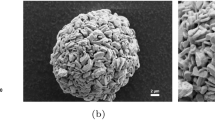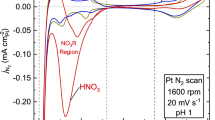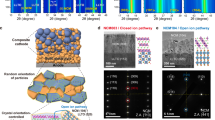Abstract
IT has been found that single crystals of sodium chloride annealed in nitrogen under mild compression between platinum electrodes produce electrical potentials when treated with traces of oxygen at 700°–730° C.
This is a preview of subscription content, access via your institution
Access options
Subscribe to this journal
Receive 51 print issues and online access
$199.00 per year
only $3.90 per issue
Buy this article
- Purchase on SpringerLink
- Instant access to the full article PDF.
USD 39.95
Prices may be subject to local taxes which are calculated during checkout
Similar content being viewed by others
References
Allnatt, A. R., and Jacobs, P. W. M., Trans. Faraday Soc., 58, 116 (1962).
Allnatt, A. R., and Jacobs, P. W. M., Proc. Roy. Soc., A, 267, 31 (1962).
Lidiard, A. B., Handbuch der Physik, 20, 246 (Springer-Verlag, Berlin, 1957).
Whitworth, R. W., Phil. Mag., 10, 801 (1964).
Class, W. H., Machlin, E. S., and Murray, G. T., Trans. Met. Soc. AIME, 221, 769 (1961).
Kanzig, W., and Cohen, M. H., Phys. Rev. Letters, 3, 509 (1959).
Author information
Authors and Affiliations
Rights and permissions
About this article
Cite this article
ALLNATT, A., CHADWICK, A. & PANTELIS, P. Voltages produced by Oxygen in Platinum-Sodium Chloride Crystal Cells. Nature 213, 1226–1227 (1967). https://doi.org/10.1038/2131226b0
Received:
Issue date:
DOI: https://doi.org/10.1038/2131226b0



